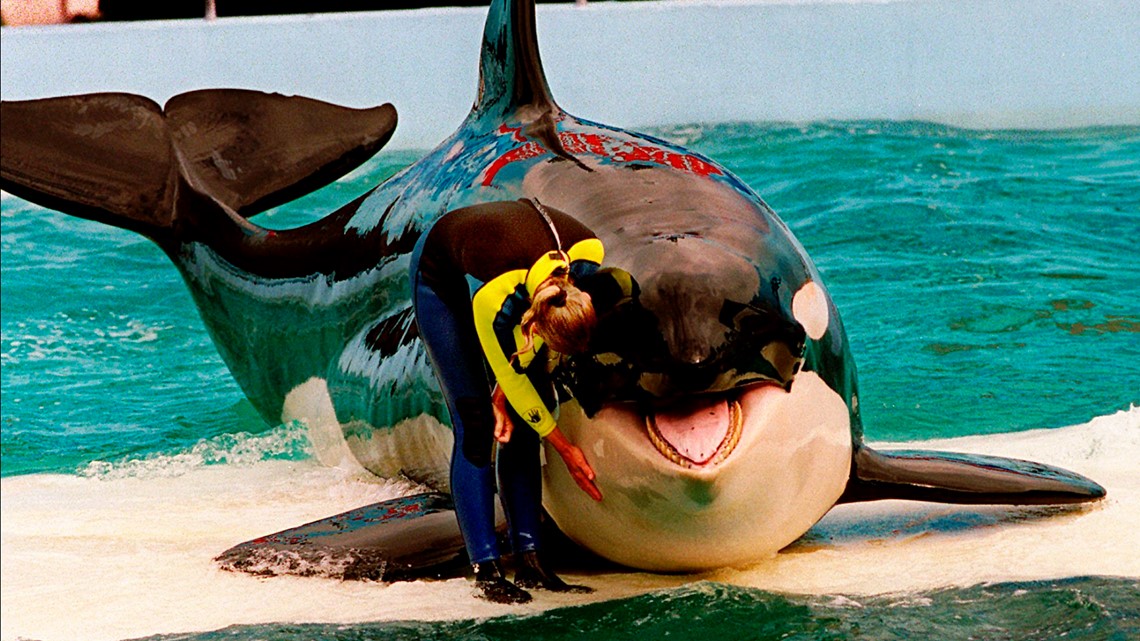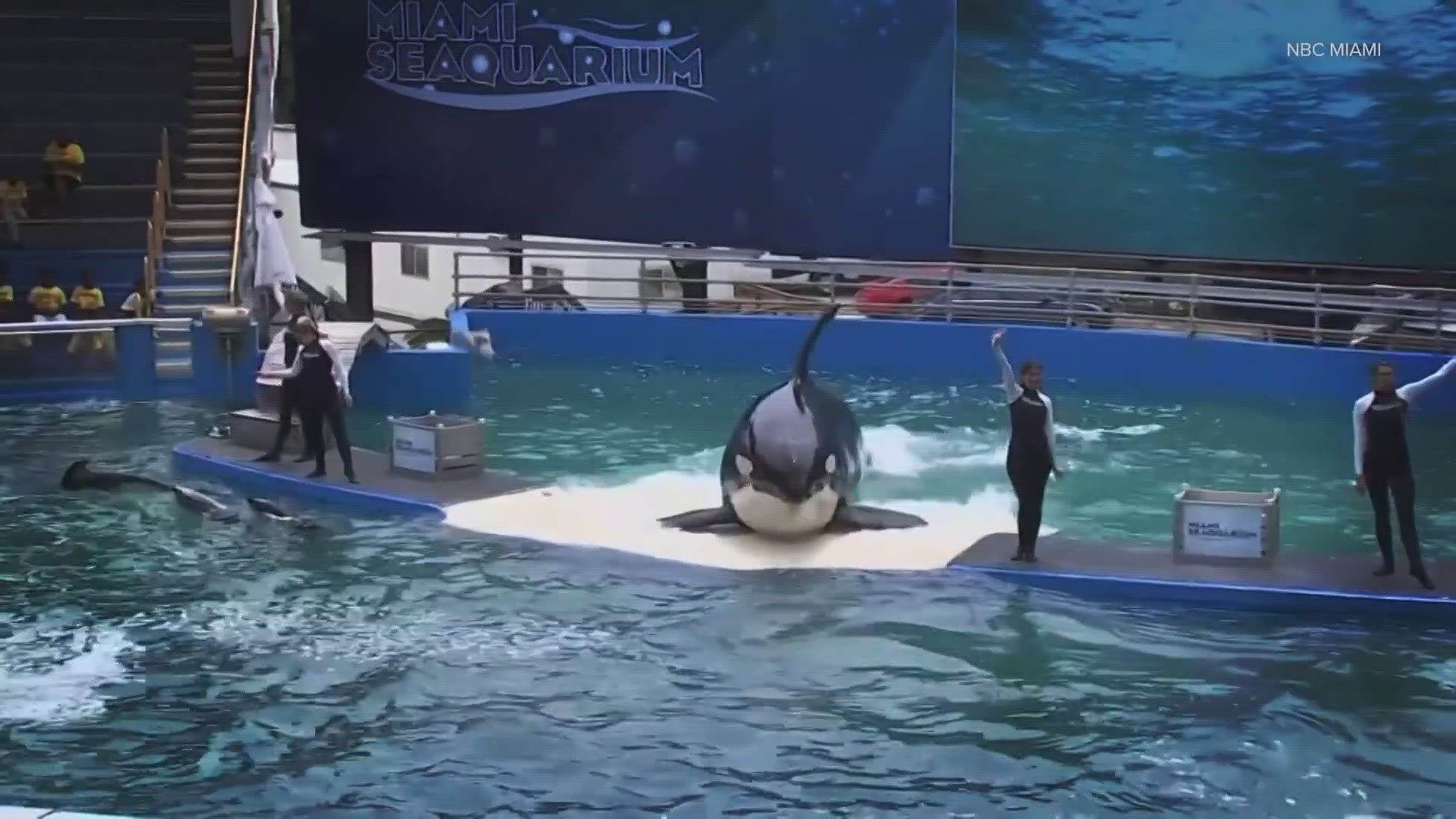INDIANAPOLIS — On Aug. 8, 1970, aircraft that specialized in separating mother orcas from their babies descended on a superpod of 90 orca in Penn Cove off Whidbey Island, about 25 miles northwest of Seattle.
Six orcas were captured, and five were killed in the process of the capture, according to Washington State state archives. Four of the orcas that died were calves, and their bellies were slit and filled with rocks, according to the Orca Network. The rest were sent to live out the remainder of their lives in marine parks across the United States
One survivor, the young orca Lolita, was sent to the Seaquarium in Miami where she has spent the last five decades of her life in a shallow tank.
Now, she may finally have a chance to return home.
The Dolphin Center in Miami announced Thursday they entered into a "formal and binding" agreement with Friends of Lolita, a non-profit co-founded by environmentalist Pritam Singh, to return Lolita to an ocean sanctuary.
Colts' franchise owner and CEO Jim Irsay will contribute to those efforts to return Lolita home.
"The story of Lolita the orca has been near and dear to my heart. I am proud, and enthusiastic, to play a role in finally returning Lolita to her native Pacific Northwest,” said Jim Irsay in a statement.
Though Irsay is now collaborating with The Dolphin Center and Friends of Lolita in efforts to return Lolita back to Salish Sea waters she once called home, the fight to do so has been in the works for decades.
Long before Irsay stepped in, it was leaders with Lummi Nation In Washington State who not only grieved the loss of Lolita, but worked to return this last orca back to Puget Sound.
Lolita's case was most recently covered in an in-depth investigation from WTHR's Seattle sister-station, KING 5. Reporter PJ Randhawa looked into the arduous, often heartbreaking fight, to return Lolita home in a report published on May 24, 2022.
'An extreme case of torture and abuse'
On the shore of the Salish Sea, members of the Lummi Nation pray for the return of someone they consider family: Sk'aliCh'elh-tenaut, a Southern Resident orca who was captured from the Puget Sound more than 50 years ago and sent to a marine mammal park in Miami.
“This is her home. Not in Miami in a cement tank," said Squil-le-he-le (Raynell Morris), a Lummi elder and the former associate director of intergovernmental affairs for the White House in 2022. "That's not where she belongs. When they stole her, it affected us. Our families were broken. We ache for our relative."
Tah-Mahs (Ellie Kinley), another member of the Lummi Nation, is also working to bring the orca home. She explained that the tribe's sacred connection to the whales goes back to a time immemorial.


“We were always out in the water at the same time with them, because we're each chasing the same fish, the same salmon,” said Tah-Mahs.
The Lummi Nation, also known as the Lhaq'temish people, call the whale Sk'aliCh'elh-tenaut. She’s also affectionately known as Tokitae. But in Miami – where she’s been held in captivity for the last 50 years – she's known as Lolita.
She is the legal property of the Miami Seaquarium.
"It's time to undo that wrong and return her back to the Salish Sea,” said Tah-Mahs.
Both Tah-Mahs and Squil-le-he-le have visited Sk'aliCh'elh-tenaut in Miami multiple times. They are also the force behind the latest effort to bring her home.
“When you are close to her, you can feel the sadness. You can just feel that she's just hanging on. It is just taking a lot longer than we had ever hoped,” said Squil-le-he-le.
The moments Lolita were first captured (were moments they never forgot)
“When she was brought to a pen on the dock by the harbor, she was crying," Squil-le-he-le said. "Her mother was crying. People around Penn Cove, the older people can still hear the cries, the screams."
“You can see so much in her eye. She is traumatized,” said Howard Garrett, co-founder of the Orca Network, as he pointed to a close-up picture of what is thought to be Sk'aliCh'elh-tenaut’s eye peering out of a net after her capture.
After her capture, Sk'aliCh'elh-tenaut was sold to the Miami Seaquarium. The animal rights group PETA claims she is kept in the smallest orca tank in the world.
“It's shallow. So there's nowhere in her tank that's deep enough that she can dive,” said Tah-Mahs. “You'll see that there's two umbrellas for the trainers that are working with her. But yet there's no shade for her.”
A 2021 U.S. Department of Agriculture inspection report of the Miami Seaquarium found Sk'aliCh'elh-tenaut is fed "poor-quality fish" and "capelin that smelled bad."
An inspector noted her health had declined as a result, saying her "sickness [was] caused by feeding the poor-quality capelin,” and the water in her tank was dirty. The report said her trainers “disregarded veterinary instructions” to make her perform despite her injuries.
“This is an extreme case of torture and abuse,” said Garrett. “She's been treated very, very badly by a lot of the staff.”
In March 2022, The Dolphin Company purchased the Miami Seaqarium. As a condition of the sale, the company had to retire Sk'aliCh'elh-tenaut. For now, she remains in Miami.
The company did not return KING 5's request for comment at the time.
“She has now gone from the corporate books from an asset to a liability," said Squil-le-he-le. "So that's a huge incentive for them to come to the table and want to partner with us."
In recent years though, Lolita has fallen ill. She is about 56 years old, and at the end of her life expectancy. Animal rights activists have joined calls for her return to her home pod in Puget Sound.
Animal rights activists have for years advocated for Lolita to be moved back to her home pod in Puget Sound, with groups like PETA taking the Seaquarium to court over the orca's captivity.
“If Lolita is finally returned to her home waters, there will be cheers from around the world, including from PETA, which has pursued several lawsuits on Lolita’s behalf and battered the Seaquarium with protests demanding her freedom for years,” PETA Foundation Vice President and General Counsel for Animal Law Jared Goodman said in a statement to NBC News.
“If the Seaquarium agrees to move her, it’ll offer her long-awaited relief after five miserable decades in a cramped tank and send a clear signal to other parks that the days of confining highly intelligent, far-ranging marine mammals to dismal prisons are done and dusted," Goodman said.
Friends of Lolita and The Dolphin Center said they are working toward a possible relocation within the next 18 to 24 months.

